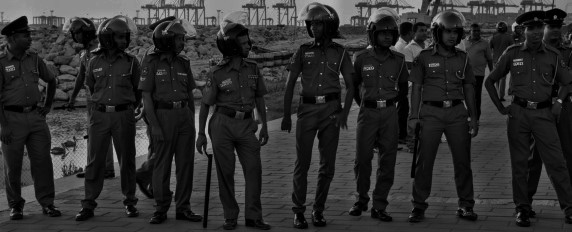Image: Police torture is endemic in Sri Lanka.
The proposed amendments to the Code of Criminal Procedure, which were gazetted on 6th March, if enacted, allow for a situation that the Officer in Charge of a Police Station can deny lawyers from accessing detainees and even police stations if such access would “impede ongoing investigations” says Centre for Policy Alternatives. (CPA).
Issuing a statement CPA says it is deeply concerned by the Bill titled Amendment to the Code of Criminal Procedure (Special Provisions) Act No. 2 of 2013 – (rights of detainees – access to legal counsel) which was approved by Cabinet of Ministers on the 21st February 2017 and gazetted on the 6th March 2017.
The statement further says:
The Bill is meant as an improvement on a previous Bill to amend the Code of Criminal Procedure, which the government did not proceed with due to concerns raised by several stakeholders including CPA. CPA notes that the present Bill seeks to provide statutory recognition to some of the existing constitutional and administrative safeguards for detainees in relation to access to lawyers, which are needed. However, we are alarmed at the proposed clauses 6A(2) and 6A(6), which are seriously flawed. These provisions, if enacted, allow for a situation were the Officer in Charge of a Police Station can deny lawyers from accessing detainees and even police stations if such access would “impede ongoing investigations”.
In a context where there is a well-documented history of custodial torture and abuse of power by the Police, providing such broad powers to an Officer in Charge is deeply troubling and unacceptable. Furthermore, these over-broad clauses would render meaningless the other rights enumerated in the Bill. As such the Bill would curtail existing constitutional and administrative protections for detainees, and like its previous avatar, facilitate the violation of rights including the commission of custodial torture. It would seem therefore that the aforementioned clauses of the proposed Bill are inconsistent with the government’s stated commitment to a zero-tolerance policy towards torture.
CPA notes that while these provisions are proposed to operate only temporarily, legislation such as the notorious Prevention of Terrorism Act (PTA) were also initially enacted as temporary provisions but became permanent over time. The government must ensure that any proposals at legislative reform meet international standards in protecting the human rights of all citizens, and not become a tool of impeding such rights. In these circumstances, CPA calls on the government to immediately remove Clause 6A(2) and 6A(6) of the Bill.
